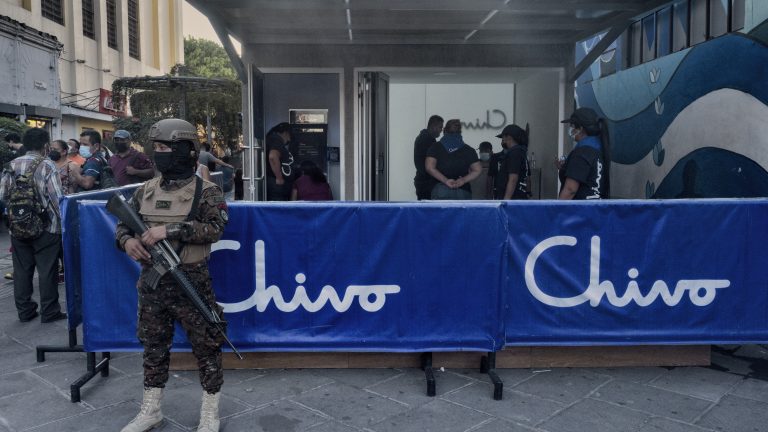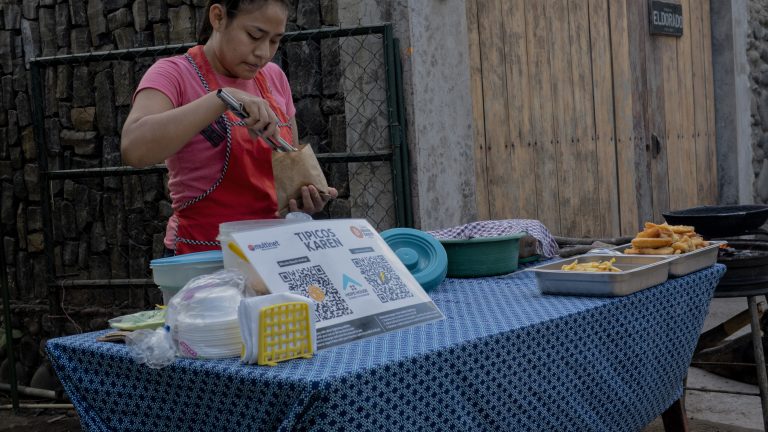When El Salvador officially made Bitcoin legal tender in September 2021, José Bonilla was one of the first citizens to sign up for a government-backed digital wallet that lets anyone use the cryptocurrency. The 23-year-old Salvadoran, who runs a shoe store with his family in the tourist town of Concepción de Ataco, was looking forward to trying out the technology. He’d heard that it would reduce costs and speed up payments.
After a few days of overcoming technical glitches, Bonilla was up and running and accepting payments in Bitcoin from customers.
But the shine soon wore off. By February 2022, Bonilla’s list of complaints about Bitcoin was long: the only available Bitcoin ATM was too far away, the government helpline was slow, and the price was too volatile. One day, he lost a $25 transaction from a customer to technical issues and never heard back from the digital wallet’s customer service team. “I decided not to use it any more,” he said.
He’s not the only one. Six months since El Salvador’s Bitcoin Law came into effect, adoption of the cryptocurrency remains patchy. Even on “Bitcoin Beach,” a rugged strip of Salvadoran coastline that has become a mecca for crypto disciples, the transition has been challenging. When Rest of World visited shortly after the law came into force, some were still unsure about Bitcoin. Coconut vendor Dina Ponce said she was able to make more sales by expanding to accept digital payments for the first time, but she didn’t fully understand the technology, and the value of Bitcoin hadn’t risen enough to give her the savings she’d hoped for.
Other businesses around Bitcoin Beach said they’d given up on Bitcoin and reverted to accepting only cash. “We were losing money because of the way the currency loses value,” said 21-year-old Axel Medina, who helps his family run a surf school and restaurant. “It was difficult to maintain our business like that.”
When President Nayib Bukele first announced the Bitcoin law in June 2021, he made a grand promise to his citizens. Adopting Bitcoin, he said, would digitize the economy, decrease dependence on the U.S. dollar, lower remittance fees — which account for about 20% of the country’s gross domestic product — and drive investment. El Salvador could become the first country to prove the transformative power of cryptocurrency on a national scale.
It is difficult to get a full picture of the scope of Bitcoin adoption in the country. In January, the government endorsed a report that at least 4 million users — nearly the country’s entire population — had been verified as authentic users of the government’s wallet over the past several weeks. But in March, a survey released by the Chamber of Commerce and Industry of El Salvador reported that 86% of the businesses contacted said they had never conducted a transaction using Bitcoin.
Interviews with dozens of Salvadoran citizens, economists, and technology developers reveal cracks in the project. Since launching, the initiative has been plagued with technical glitches, while tensions have arisen from the mismatch between Bitcoin’s decentralized ethos and El Salvador’s authoritarian government.
As Bukele continues to double down on Bitcoin, his interest now appears to be less about getting everyday Salvadorans to adopt the cryptocurrency and more about addressing his administration’s economic troubles and boosting his own image.
“Why did he do this?” said Alex Gladstein, the chief strategy officer for the Human Rights Foundation and an advocate for global Bitcoin adoption. “To me it’s kind of obvious. He did it for self-interest and to get famous.”
El Salvador’s association with Bitcoin began in 2019 on Bitcoin Beach, in the town of El Zonte. That’s where an evangelical surfer named Mike Peterson teamed up with a local resident, Jorge Valenzuela, to transform the small coastal town into a circular economy built around the cryptocurrency.
Seeing potential for a nationwide application, President Bukele announced his Bitcoin Law at a cryptocurrency conference in Miami in June 2021. The law made El Salvador the first country to accept Bitcoin as legal tender and required businesses to accept it as payment.
“In El Salvador, we are trying to start the design of a country for the future,” Bukele proclaimed during his video message to the conference.
To lay the groundwork for the transition, the government spearheaded development of technology that would make it possible for citizens to buy and sell using Bitcoin, including a digital wallet called Chivo. (Chivo literally means “goat” in Spanish but is also Salvadoran slang for “cool.”) Users could use the Chivo Wallet to receive or send cryptocurrency funds — think Venmo or Paypal, but for Bitcoin. The government has refused to provide many details about the corporation that developed and owns this technology, but Rest of World has interviewed some of the private firms involved with the rollout. A U.S.-based cryptocurrency company, Athena Bitcoin, plays the largest role.
Rest of World met with Athena Bitcoin CEO Eric Gravengaard in the Insigne skyscraper, a towering hunk of glass and steel in the upscale neighborhood of San Benito, where he described how the company first got involved with El Salvador’s ambitious experiment.
Athena Bitcoin was originally focused on building Bitcoin ATMs, which let users exchange fiat currency for cryptocurrency or vice versa, in the U.S. In 2019, Gravengaard, who knew Bitcoin Beach founder Peterson through a mutual friend, offered to provide one for the project. He visited El Salvador in February 2020 to help install the machine, which was El Zonte’s first ATM of any description. Over the following months, he fielded calls from people in El Salvador who told him that they were driving to El Zonte from San Salvador, 50 kilometers away, to use the ATM. He decided to send a couple more.

The new ATMs were being processed in customs when Bukele announced the Bitcoin Law. Gravengaard said the administration asked if the company wanted to do a ribbon-cutting ceremony and install more than 200 ATMs across El Salvador. These would later become Chivo-branded machines.
“We came to El Salvador without a political agenda,” said Matias Goldenhörn, Athena’s director of Latin America. “We came to El Salvador because we are Bitcoiners.”
“We came to El Salvador because we are Bitcoiners.”
Soon, Athena also took on a bigger project: designing the front end software for the Chivo Wallet, as well as a point-of-sale system, called Athena Pay, that would allow stores to accept Bitcoin. Actually sending Bitcoin back and forth can be expensive and slow, and requires a certain level of technical know-how. Athena’s ATMs would be useless if the average Salvadoran did not have a digital wallet they could use to buy and sell Bitcoin in a fast and cost-effective manner. By December, 950 Athena Pay terminals had been installed and were in use across the country.
The amount paid to each company involved in the Chivo rollout is unknown. Reporting from Salvadoran and US outlets estimates the government has spent upwards of millions of dollars. In September, when the Bitcoin Law came into effect, Athena’s stock price briefly shot up over 600%.
Gravengaard describes himself as a libertarian and sees no contradiction in El Salvador’s Bitcoin ecosystem being controlled by the Bukele administration. “Money is social,” he told Rest of World. At some point, as a participant in the economy, you have to cede some control and trust someone else, whether it is the developer of an app, a bank, or a government. “I don’t particularly want to live in a world where I don’t trust anyone,” he told Rest of World. “It’s not a happy world.”

Bitcoin adoption over the last six months has not gone smoothly.
For one, El Salvador is a country where cash is still king; almost 70% of the population is unbanked. Critics say the country’s Bitcoin transition leaves behind those who don’t have a smartphone — mainly older Salvadorans — and those without internet access. In 2019, about 50% of the population was not online.
Furthermore, many Salvadorans were clueless about Bitcoin when they found out their country planned to make it legal tender; one poll of around 1,300 Salvadorans by the Central American University leading up to the rollout showed only about 10% of respondents fully understood cryptocurrency. Alejandro Molins, who works at Athena Bitcoin and whose job it is to get merchants in El Salvador to download and use the Chivo Wallet, told Rest of World that his own mother has yet to sign up for her Chivo Wallet.
Some of those who have signed up have complained of technical issues with the Chivo app, including accounts created through identity fraud, lost transactions, and receiving error codes when trying to make payments.
In September 2021, Eunice Melara, a 22-year-old medical student, waited in line behind dozens of people at a Chivo ATM in San Salvador, shortly after launch. She was excited to try out the app, but saw an erroneous balance on her account. When she contacted the government call center, it couldn’t resolve the issue and told her they would open a case. “It hasn’t worked all day, and I had to call the call center and they told me they had opened a case,” she told Rest of World. She hoped to have more luck resolving the issue in person.
Others have more ideological complaints about the technology. Mario Gómez, a software developer in his mid-30s, learned about El Salvador’s Bitcoin project along with the rest of the world, when Bukele announced it in June 2021. “It took us all by surprise,” he said.
“Chivo is a promise to pay Bitcoin or dollars. It is no different from a bank account.”
Gómez took an interest in the digital infrastructure the Salvadoran government was building for its transition to Bitcoin, including the Chivo Wallet, which is what is known as a custodial wallet. Custodial wallets address a common problem for cryptocurrency users. Bitcoin payments employ the blockchain, a process by which every financial transaction is logged in a digital ledger and then verified through a computational process. Users hold a public key, which assigns them to their Bitcoin holdings, and a private key, which allows them to access their funds. But this can cause problems. Users who lose their private key, for instance, can never recover their Bitcoin. With a custodial wallet, a third party holds the keys so that users don’t have to worry about losing them.
It made sense that the Chivo Wallet would be custodial — the administration had to build a wallet that would be functional for everyday people, the majority of whom had never even had a bank account. But it didn’t sit right with Gómez. Many Bitcoin purists criticize custodial wallets as contradictory to what they see as cryptocurrency’s fundamental ethos of decentralization. A famous adage in the crypto world goes, “Not your keys, not your coins.” In other words, if another entity has access to your private key, you don’t actually own your Bitcoin. Even though Chivo is technically a private company, it is 99% owned by a state-owned company and funded by a $150 million public trust. In effect, the government would control its citizens’ keys.
Gómez drafted long Twitter threads about his findings. The next day, a few days before the Chivo Wallet was set to launch, the police pulled him over for what they said was a problem with his car, took him to two stations, and confiscated his phones. Authorities announced that he was being investigated for financial fraud, but Gómez was never formally arrested or charged with a crime. Two organizations have filed a complaint with the country’s attorney general alleging Gómez’s detention was arbitrary. He suspects that he was targeted for speaking out about Chivo. Rest of World has reached out to the authorities but has yet to hear back.
The Chivo Wallet isn’t mandatory for Salvadorans — they can choose to use a different Bitcoin wallet — but users were incentivized with a $30 sign-up bonus, equivalent to almost three days’ minimum wage.
Some boosters of crypto adoption insist on distancing the wallet from Bitcoin’s decentralized ethos. “Chivo is not Bitcoin,” Gladstein from the Human Rights Foundation told Rest of World. “Chivo is a promise to pay Bitcoin or dollars. It is no different from a bank account.”

In November 2021, two months after the Bitcoin Law came into effect, hundreds of visitors poured into San Salvador’s small international airport from across the world. They were waived past the immigration check without paying the usual $12 fee to enter the country (although, if they wanted to pay, the officers accepted Bitcoin.)
It was Bitcoin Week in El Salvador, a week of conferences and events that attracted an international crowd of cryptocurrency believers and an opportunity for Bukele’s administration to convince the global Bitcoin community of what the cryptocurrency could do for El Salvador — and what El Salvador could do for Bitcoin.
Bitcoin Beach had transformed itself for the occasion. The streets were littered with food stands with big plastic signs emblazoned with the Bitcoin symbol. A DJ played techno and pop songs, including a cryptocurrency-themed version of “Despacito,” the lyrics “Tengo que bailar contigo hoy” (I have to dance with you today) replaced with “Tengo que comprar un bitcoin hoy” (I have to buy a bitcoin today).
Dagart Allison, who told Rest of World he is a property manager from Los Angeles who dabbles in cryptocurrency as a hobby, had been at Bukele’s initial announcement at the Miami Bitcoin conference. He was so enthusiastic about the Bitcoin Law that he knew he had to visit El Salvador, but he was concerned about safety issues in the country. Bitcoin Week was the perfect excuse to come, knowing that he would be surrounded by a wave of like-minded people.
“Then you come here, and you realize that on the ground, it’s a different ordeal. It’s a struggle.”
But the Bitcoin mecca didn’t quite live up to his expectations. He had tried to rent a surfboard from a stand in El Tunco with Bitcoin, and they told him they didn’t accept it. He asked if they had Chivo. They said yes, but they didn’t know how to use it with other wallets — the functionality was hidden behind a confusing array of buttons.
“From a Bitcoin perspective, it’s amazing — it’s so groundbreaking and beautiful and, in my mind, looks like perfection,” he said about El Salvador. “And then you come here, and you realize that on the ground, it’s a different ordeal. It’s a struggle.”
Craig Toennies, a cheerful émigré from the United States who ran a hostel in El Zonte before leaving during the pandemic, said that the Bitcoin Week preparations made it seem much more catered around the cryptocurrency than it actually was. “It had a very Potemkin village vibe,” he said. Since he returned in November, he said, the only people he’s seen carry out transactions with Bitcoin have been tourists.
The highlight of Bitcoin Week was announced with just a day’s notice, after all the conference panels had ended and many attendees had already flown home. Swigging from bottles of Suprema and Regia beer, the remaining crowd faced a stage overlooking the Pacific coast, just down the road from El Zonte. Late in the evening, they raised their smartphones, ready to record, as fireworks exploded overhead. A man walked casually onstage, wearing a white shirt, slacks, and a backward baseball cap and carrying a microphone. Words on the screen introduced him as “El Presidente”: Bukele had come to speak to the crowd.
As the music died down, he addressed his audience in English: “So, how’s Bitcoin Week going?”

Bukele spoke the Bitcoin community’s language, referencing Satoshi (Satoshi Nakamoto, the pseudonymous creator or creators of Bitcoin) and sprinkling his speech with insider jargon like “orange pilled” (an ideology that posits Bitcoin as a champion of freedom and monetary sovereignty).
Then, he made the announcement he’d been leading up to: the creation of a new city called Bitcoin City, in the southern region of La Unión.
“It’s not just an idea, but it would actually be a legal municipality, with a mayor and everything,” he said.
Bitcoin City, he continued, would include residential and commercial areas, museums, an airport — “everything, devoted to Bitcoin.” It would feature volcano-powered Bitcoin mining and a central plaza shaped like the “B” symbol of Bitcoin.
Naturally, as in the rest of El Salvador, Bitcoin would be legal tender. But the crowd roared loudest when Bukele outlined further incentives. Residents, he said, would pay no income tax, no capital gains tax (“Invest here, make all the money you want,” he said), no property tax, no payroll tax, and no municipal tax.
Bukele invited up Samson Mow, then chief strategy officer of a cryptocurrency company called Blockstream, to the stage. The city, Mow explained, would be funded with a $1 billion “Bitcoin bond,” initially backed by the cryptocurrency. Half of the money raised would go to helping build the energy and mining infrastructure. The other half would go to buying more Bitcoin — the theory, according to Mow, being that if Bitcoin continued to appreciate in value, El Salvador would reap the benefits and pay back the bondholders with interest.
“If you want to invest in El Salvador, this is the easiest way to do it,” Mow told the crowd. He imagined a future in which other countries would also issue Bitcoin bonds. “This is the beginning of nation-state Bitcoin FOMO,” he said.

For Bitcoiners like Allison, the nature of the announcement was off-putting. “A lot of times in Bitcoin, the more people are doing showy stuff, the more we become skeptical,” he told Rest of World. “If it’s such a good thing, it should speak for itself.” He was, however, excited about the idea of a city built around Bitcoin.
Some economists Rest of World spoke with suspect a link between the Bitcoin bonds and El Salvador’s debt crisis, which has been growing under Bukele and his two predecessors, putting him in a tough position, particularly if he wants to keep funding his populist policies. El Salvador will have to pay $800 million on its traditional dollar bonds by January 2023.
“With most economies, if their situation is normal, they have access to international capital markets,” said Álvaro Trigueros Argüello, an economist at the Salvadoran Foundation for Economic and Social Development. “What happened in El Salvador is that sovereign risk has been going up, especially at the beginning of the pandemic.”
As a result, the Bukele administration has been shut out of international capital markets. The usual way out of this debt would be through a multilateral loan. But, thanks to the Bitcoin Law, Bukele has been chided by the International Monetary Fund. In late January, the organization warned him to remove Bitcoin as legal tender. Bukele responded on Twitter with a meme from The Simpsons.
This is where the Bitcoiners could come in. The first bond is supposedly going to be spent on infrastructure in Bitcoin City and buying more Bitcoin. But, should it prove successful, the government could potentially consider issuing similar bonds in the hopes of raising capital to offset the debt, without turning to the IMF. “That first bond is not going to solve the financial problem of the government,” Trigueros told Rest of World. “What we believe they have in mind is that if this first bond is successful, then they can issue new, similar bonds to solve the financing gap of the budget.”
In January, when asked in a press conference if the Bitcoin bonds would be used to cover El Salvador’s impending loan payment, as well as plug a budget gap, Bukele’s finance minister, Alejandro Zelaya, responded, “When they are issued, we will see if they are successful in that strategy, which I think they are.” Zelaya has not responded to a request from Rest of World for comment.
“The characteristic of this government has been improvisation when it comes to economics.”
Salvadoran economist Rommel Rodríguez said he doubts that Bukele planned all along to appeal to Bitcoiners to help solve El Salvador’s economic troubles. Rather, he believes the solution appeared to him along the way. “The characteristic of this government has been improvisation when it comes to economics,” he said.
Rodríguez predicts Bukele could bring in a large sum from the Bitcoin fans he has courted by “gambling” the country’s future on Bitcoin but doubts that he would raise the full $1 billion. “The problem is — as we say in the very Salvadoran way — a man has his way of being,” said Rodríguez. “Going back now and taking the recommendation of the IMF would be a harsh blow to his international image.”
Bukele originally said the Bitcoin bonds would be available by early 2022. On March 11, Zelaya, the finance minister, said they might be issued in mid-March. At the time of publication, they had not yet been made available.
Meanwhile, Bukele is no less bullish on Bitcoin. He regularly takes to Twitter to boast about purchasing Bitcoin using government funds — to date, the government has acquired over 1,000 bitcoins. But since reaching a high of nearly $69,000 in early November, the price of a single bitcoin has fallen, dropping almost 50% at one point toward the end of January and reducing the value of the country’s Bitcoin holdings by potentially tens of millions of dollars. Bukele may well fall victim to one of the central reasons governments tend to shy away from Bitcoin: its volatility.
“Before [Bukele] did the Bitcoin Law, he was not well-known. Today, he’s easily the most famous Central American leader,” said Gladstein. “He’s staking his whole reputation on this.”
Back in Concepción de Ataco, four months after the crypto conference, Bonilla, the shoe store owner, hadn’t heard of Bitcoin City or the Bitcoin bonds. He remained unconvinced by the cryptocurrency. The survey released by the country’s chamber of commerce in March found that only 3.6% of business owners said Bitcoin had helped with their sales.
“It’s basically just the big companies that are using it,” Bonilla said. “Between bitcoin and cash, I prefer that [customers] pay me in cash.”





